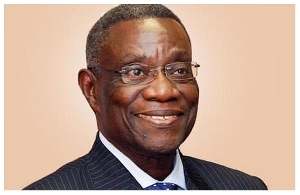Government has given what Energy Minister, Emmanuel Armah-Kofi Buah, calls “a very lengthy conditional approval” for Tullow Oil to drill two additional wells at the jubilee oil fields in a bid to boost oil production and avert a feared slump.
Tullow Oil had made the request for four infill wells, which are drilled between producing wells for the purpose of more efficient recovery of petroleum from a reservoir.
The approval means government has softened its initial stance that the company goes ahead to do a full field development, which was a condition on which the Plan of Development (POD) for phase one of jubilee was approved.
Tullow’s argument has been that the interim measure will put off what it fears could be a slump in oil production from the field in 2016. The field is yet to hit the 120,000 barrels of oil per day plateau level, which it was expected to hit by now.
“We basically think that there is real sense and justification in their request. We were also guarding against what they had cautioned – a possible slump in production. So this was a safeguard. But there are clear conditions that they have to meet with the Petroleum Commission before the permission is granted,” the minister told the B&FT.
“One of the conditions is for them to make a written commitment to go ahead with full field development and they have done that.”
A full development plan would give a clearer idea of what the field contains, and what the most cost-effective way of developing it would be.
The condition on which government approved the Plan of Development (POD) for phase one -- which covers only a portion of the field -- was that Tullow and co would do a full development plan subsequently.
Currently, the Jubilee Field has twelve production wells, eight water injection wells, and three gas injection wells.
The slump in crude oil prices has hit oil producers, including Tullow, hard, with the company considering a head count.
Government itself may miss by far its 2015 petroleum revenue projection of US$1.2 billion based on a benchmark price of $99 per barrel. The price of Brent crude was up around $115 per barrel back in June 2014. As at yesterday, March 3, 2015, it hovered around US$59.5, and that is even some level of recovery.
According to energy policy think-tank, Africa Centre for Energy Policy (ACEP), government will not meet the estimated US$1.2 billion revenue target for 2015 even if oil production is increased by more than 10% over current levels of 105,000 barrels per day.
Another think-tank, the Natural Resource Governance Institute (NRGI), has done a simulation which suggests that if the Brent crude oil price were to trade at $70 per barrel throughout 2015, as opposed to the $99 per barrel benchmark price, actual petroleum revenue to the government would fall short by 31 percent, or $430 million.
As compared to budget figures, however, the shortfall is projected at 23 percent, or $281 million.
The NRGI indicated, however, that Annual Budget Funding Amount will be protected under a $70 per barrel price scenario but said the shortfall would affect GNPC negatively, allowing it to withhold $52 million less in revenues (a 25 percent reduction).
“The accumulation of revenues into the two petroleum funds would slow dramatically under the $70 scenario: by our calculations, $24 million would accrue to the Ghana Heritage Fund in 2015 and $56 million would accrue to the Ghana Stabilization Fund. (In both cases this figure is 74 percent lower than what would be obtained in a $99 scenario.)”
A proposal is however under consideration, as part of the review of the Petroleum Revenue Management law, to allow the Minister of Finance to propose a review of the Petroleum Benchmark Revenue “if there are evident indicators that prices and output will change significantly in the course of the year,” according to the Finance Minister.
Business News of Wednesday, 4 March 2015
Source: B&FT













